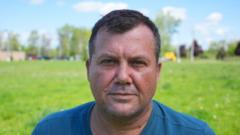Charl Kleinhaus, an Afrikaner farmer, defends his newfound refugee status in the US, detailing the threats that drove him to leave South Africa amidst claims of discrimination.
Surviving Discrimination: Afrikaner Charl Kleinhaus Defends His US Refugee Status

Surviving Discrimination: Afrikaner Charl Kleinhaus Defends His US Refugee Status
Afrikaner farmer Charl Kleinhaus shares his story of fleeing South Africa and navigating life as a refugee in the United States.
Charl Kleinhaus, a 46-year-old Afrikaner, recently transitioned from life on his family's farm in Mpumalanga, South Africa, to a humble budget hotel in Buffalo, New York. This drastic change comes after he received death threats on social media, prompting him to pursue refugee status in the United States under a controversial policy from former President Donald Trump designed to protect white South Africans facing alleged discrimination—a claim the South African government denies.
Kleinhaus describes his move as far from a leisure endeavor, stating, “I didn't come here for fun," highlighting the emotional toll of leaving behind his home, car, pets, and mother. He insists that the safety of his children made the drastic decision worthwhile. The refugee offer aimed at Afrikaners has long fueled discussions within American politics, especially on the right, where figures like Trump have framed the situation as one of genocide—an assertion widely dismissed by critics.
His arrival in the US, alongside 58 other Afrikaners, followed expedited processing of their refugee applications. Kleinhaus voiced surprise at the speed of his relocation and gratitude towards Trump, believing it indicated a recognition of their plight. The resettlement ceremony was marked by an emotionally charged welcome featuring patriotic decorations, which he found overwhelming yet heartwarming.
The background of Kleinhaus and his fellow Afrikaners is complex; they belong to a community that instituted apartheid policies until the regime's fall in 1994. They now represent a minority and face accusations of having an excessive claim on land that is crucial to the ongoing discussions of land reform in South Africa. The South African government has enacted policies that allow for the seizure of land without compensation—a law that is met with mixed reactions, with some Afrikaners like Kleinhaus feeling increasingly threatened.
Kleinhaus has faced criticism from fellow Afrikaners who view his claims of persecution as a form of opportunism. While acknowledging that crime affects everyone in South Africa, he argues that receiving threats and experiencing local hostility were compelling reasons for his departure. He recounts receiving ominous messages warning of violence against him, including one alarming note saying, "We are coming for you, you better be awake."
His public statements have also drawn scrutiny over previously posted antisemitic remarks, which he claims were not representative of his beliefs but stemmed from a specific incident while he was under medical treatment. He has since retracted those comments. Despite the controversy, Kleinhaus maintains confidence in the US vetting process, even as concerns arise regarding its transparency and the political implications of selectively allowing white Afrikaners to claim refuge while excluding others, like Afghans.
As Trump's policies may shift with new administrations, Kleinhaus acknowledges the unpredictability of his situation, yet expresses faith that his arrival in the US is part of a divine plan. “My life is in His hands,” he reflects, “and if He didn't want me here, I wouldn't be.” With aspirations to contribute positively to American society, he hopes to thwart any perceptions that his relocation is merely an advantage-seeking endeavor, insisting instead on his commitment to building a new life free from fear.



















